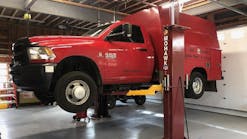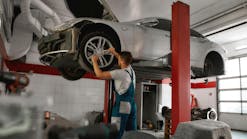Content brought to you by Motor Age. To subscribe, click here.
What you'll learn:
- How to efficiently manage your team by setting goals for them and giving them authority to make positive changes
- How your business can grow without being micromanaged
- Why incentive-based pay plans must be customized
Rising operating costs and technician shortages are the norm, and it’s harder than ever to hire the help you need. So how are shop owners supposed to find the time to grow the shop? After all, there is only so much of you to go around. If you must micromanage every area of the business, then the only way to get it all done is to subtract from your personal and family time.
How else are you supposed to oversee inspections and bookkeeping and part/core returns and payroll and employee efficiency and profit margins? For owners in the thick of it, it can feel like the only way to get it all done is by sacrificing family, health, and well-being.
Is that just what it takes to run a successful shop? Absolutely not. It’s not sustainable, practical, or necessary.
The real solution is to empower your team. When your employees have the right tools, they share the same goal, and they have the authority to make positive changes. Your shop can grow – better, faster, and more sustainably – than you could on your own. (And without having to sacrifice your own happiness to get there!)
So, how do you build a team that wants your shop to succeed?
Designate goals and who’s responsible for achieving them
If the goal is for your team to do the things necessary for growing the shop without you having to micromanage, then the first step is to make it clear who is responsible for each specific, actionable, attainable metric. Just as important, you need to provide them with processes and procedures they can follow to hit their goals.
For example, if your team is going to help you manage profit margins, that means helping them understand where your shop is now, where it needs to go, and their daily steps for working toward that goal. Will they be responsible for adjusting pricing? Whose job is that, specifically, and what steps should they follow each morning to hit that goal?
The team can’t manage daily what isn’t being measured daily, though; if you can’t see your profit margins until the month is over, then it’s too late. The opportunity to hit your goals for that month has already passed.
Once your team understands what their goals are and how to hit them — and they can see their progress daily so they know if they’re winning or losing — they can grow your shop without you having to micromanage.
Empower your team to make needed changes
One critical missing piece, though, is empowerment. If your team has the responsibility for hitting a goal but none of the authority to make the changes each day to hit it, then nothing will change. Not only can the team not make progress, but they’ll also start to quit. Having the responsibility to hit a goal without being empowered to hit it is a helpless situation.
The good news, though, is that your team can manage a lot of the production pipeline when they have clear goals, policies, procedures, and measurements.
One such area is the shop’s inspections. Top shop owners recognize that when technicians do a thorough inspection, they help create a full work pipeline. Customers trust the shop more when the service advisors educate them to make the right decisions for their vehicle, leading to future sales and repeat visits.
But for that to be true, technicians must complete a thorough inspection on every vehicle. When a tech pencil-whips the inspection, what happens next? Can the service advisor send it back to be redone?
That’s what I mean by empowering the team. When they have the responsibility to improve a number, the steps needed to get there, the authority to make changes, and the optics to see their improvements each day, your team can help you make the changes you’ve always wanted to see in your shop.
Incentive-based pay plans must be customized
The only step left is to incentivize them so that they want to make those changes. This comes with a huge warning sign, however: pay plans are not one-size fits-all.
Proper incentive-based pay plans must be built with the knowledge of where your shop is and where it needs to go. Any pay plan you can buy off the shelf is bound to create disincentives that hurt the shop, the employee, the customers, or all three.
These are not small warnings. Unless you’re willing to find somebody with a lot of experience to help you build an incentive-based pay plan based on your history and goals, it would be better not to use incentives at all. There are immense downsides to getting this wrong.
But the inverse is true, too. When a pay plan is built for your unique situation and your unique goals, your entire team is invested in seeing your shop succeed. You no longer need to micromanage people or processes to ensure that your team does the right thing with every vehicle, every time.
To give you a picture of just how powerful the right incentive-based pay plans can be, my shop, Keller Bros. Auto Repair in Littleton, Colo., continues to set sales and profitability records year after year, even though we’ve been running the shop remotely for decades. The reason we’re able to do that is because the team is trained, accountable, empowered and incentivized to do things the right way, every single time.
You don’t have to sacrifice your time and health to grow your shop, and you don’t have to miss out on time with friends and family to get your shop to the next level!
Follow these clear steps for empowering your team – and avoid major pitfalls when choosing incentive-based pay plans – and you’ll make this next year your best yet, no matter what happens in the economy or job market.
You can do it! I’m excited to hear your success story!
Whether you need marketing that delivers results, incentive pay plans, training CDs, business coaching, or the same shop management system used by Keller Bros – Shop4D – to maximize your team’s production, find the solutions you need at https://autoprofitmasters.com/empower.



